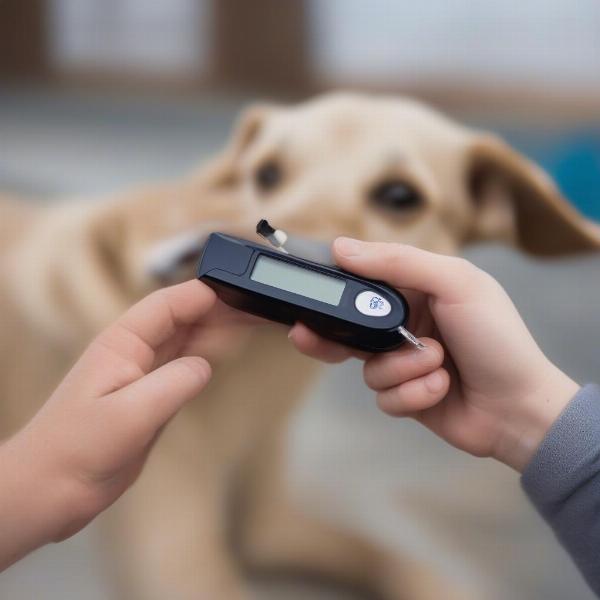Dogs have an incredible sense of smell, far superior to our own. This raises the question: can dogs tell if you’re sick? The answer, based on increasing scientific evidence and anecdotal accounts, is a resounding yes. But how do they do it, and what illnesses can they detect? This article will delve into the fascinating world of canine scent detection and explore the ways dogs can identify sickness in humans.
How Dogs Detect Illness
Dogs possess up to 300 million olfactory receptors in their noses, compared to a meager 6 million in humans. This allows them to detect subtle changes in our scent profile that occur when we’re ill. These changes can be caused by variations in our body temperature, the release of specific volatile organic compounds (VOCs), or even minute alterations in our breath and sweat.
The Power of VOCs
VOCs are organic chemicals that evaporate easily at room temperature and have a distinct odor. Many diseases, including cancer, diabetes, and infections, can cause the body to release unique VOCs. Dogs, with their powerful noses, can be trained to recognize these specific scent signatures and alert their handlers to the presence of disease.
Changes in Body Temperature and Behavior
Even without specialized training, dogs can often pick up on subtle signs of illness, such as changes in body temperature or behavior. A dog might become more clingy or protective if they sense their owner is unwell. They might also lick or sniff areas of the body affected by illness, almost as if trying to pinpoint the source of the problem.
Diseases Dogs Can Detect
Research has shown that dogs can be trained to detect a variety of diseases, including:
- Cancer: Studies have demonstrated dogs’ ability to detect lung, breast, prostate, and other cancers by smelling breath, urine, and tissue samples.
- Diabetes: Dogs can be trained to alert their owners to low or high blood sugar levels, potentially preventing dangerous diabetic episodes.
- Infections: Dogs can detect bacterial and viral infections, sometimes even before symptoms appear. This can be especially helpful for people with compromised immune systems.
- Seizures: Some dogs can sense an impending seizure and warn their owners, allowing them to take preventative measures or seek a safe place.
 Dog alerting a diabetic owner
Dog alerting a diabetic owner
The Science Behind the Sniff
While the exact mechanisms by which dogs detect disease are still being investigated, the evidence clearly points to their remarkable olfactory abilities. Their noses act like highly sensitive chemical analyzers, capable of distinguishing between an incredible array of scents and detecting VOCs at concentrations far below what humans can perceive.
“Dogs’ ability to detect disease is truly remarkable,” says Dr. Emily Carter, a leading researcher in canine olfaction. “Their noses are incredibly sophisticated instruments, capable of picking up on the most minute changes in our scent profile.”
Living with a Medical Alert Dog
If you have a medical condition that a dog could potentially detect, you might consider getting a medical alert dog. These specially trained dogs can provide invaluable support and improve your quality of life. However, it’s crucial to remember that these dogs are not a replacement for medical treatment and should be used in conjunction with traditional medical care.
Conclusion
Can dogs tell if you’re sick? The evidence overwhelmingly suggests that they can. From subtle changes in behavior to the detection of specific disease markers, dogs’ incredible sense of smell gives them a unique ability to perceive our health status. As research continues, we are likely to uncover even more about the amazing ways dogs can help us monitor and manage our health.
FAQ
- How accurate are dogs at detecting disease? While dogs show great promise in disease detection, their accuracy can vary depending on the disease and the individual dog. Further research is needed to standardize training and assessment methods.
- Can any dog be trained as a medical alert dog? Not all dogs are suitable for medical alert work. It requires specific temperament traits, such as focus, trainability, and a strong desire to please.
- How do I get a medical alert dog? Reputable organizations specialize in training and placing medical alert dogs. It’s essential to do your research and choose a reputable organization.
- Are medical alert dogs covered by insurance? Insurance coverage for medical alert dogs varies. Check with your insurance provider to see if coverage is available.
- Can I train my own dog to detect my illness? While you can work with your dog on scent recognition, training a reliable medical alert dog requires specialized expertise and is best left to professionals.
- What should I do if my dog seems to be constantly sniffing a specific part of my body? If your dog exhibits unusual sniffing behavior, it’s always a good idea to consult with your doctor. While it doesn’t necessarily mean you’re sick, it’s better to be safe than sorry.
- Do dogs’ abilities to detect illness extend beyond humans? Yes, dogs have also been trained to detect diseases in other animals and even pests in agricultural settings.
Related Articles on ILM Dog
ILM Dog, your trusted resource for canine care and companionship, provides expert guidance on all aspects of dog ownership. From breed selection and health care to training and nutrition, we offer practical advice backed by the latest veterinary research. Whether you’re a seasoned dog owner or just starting out, ILM Dog is here to help you build a stronger bond with your furry friend. Contact us at [email protected] or +44 20-3965-8624 for personalized support.